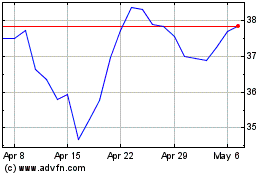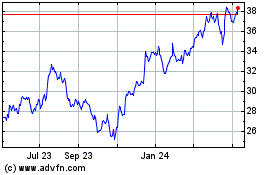By Sarah Krouse
B Corp. told a 92-year-old customer it would attempt to recover
nearly $40,000 he lost to a phone scam -- but only after the man
signed legal papers promising not to discuss the fraud or sue the
bank.
The bank couldn't guarantee it would recoup any of the money,
but under the terms of the agreement, if the elderly man is asked
about the funds he sent scammers or efforts to recover it he must
say "the matter has been resolved," according to a copy of the
document reviewed by The Wall Street Journal.
Such agreements help conceal losses to scammers, consumer
advocates say, limiting awareness of increasingly sophisticated
forms of fraud that many victims already find embarrassing. Many of
the scams spring from the billions of robocalls in which fraudsters
attempt to dupe victims into sending wire transfers or buying
retail gift cards.
Banks and credit unions in the U.S. submitted nearly 48,000
suspicious activity reports to the Treasury Department's Financial
Crimes Enforcement Network relating to suspected fraudulent wire
transfers in 2019, more than double the number submitted five years
earlier. Meanwhile, the number of robocalls of all varieties
continues to mushroom, opening the door to more potential financial
losses.
"Everything seems like a black hole," said Jim Feldman, the Bank
of America customer's son, who worked to help his father recover
the lost assets. "The only way it seemed feasible to us to get
anything was to go through Bank of America."
Documents the family received from Bank of America stated that
the bank wouldn't be able to start the process until the agreement
was returned, and said the customer must sign and return the
agreement within 10 days or else the inquiry would be closed.
Mr. Feldman's father signed the agreement and did not speak to
The Journal.
A Bank of America spokesman said the bank immediately takes
steps to recover money and support clients as soon as it is
notified of a scam. "In this particular instance we immediately
reached out to the bank that had received the funds," the spokesman
said, adding that the bank has received the funds back and made the
customer whole.
"We are always re-evaluating how we communicate with clients to
make sure it is as simple and clear as possible and will look at
this to evaluate any room for improvement and simplification," he
said.
Victims of scams that have made wire transfers, in particular,
fall between gaps in banking and consumer protection regulations,
said Daniel Schlanger, a New York-based consumer-protection lawyer.
While banks are liable for some fraudulent credit card charges,
they aren't on the hook for wire transfers consumers themselves
have authorized, he said.
"There's no specific legal obligation" for banks to help fraud
victims recover funds they agreed to transfer, said Kim Phan, a
partner at law firm Ballard Spahr LLP.
"In these cases where the customer authorized the transactions,
we are acting voluntarily to assist the customer and try to assist
them and law enforcement in any way we can," the Bank of America
spokesman said.
Some banks ask customers to sign confidentiality agreements,
attorneys say, because they don't want consumers who hear about
another person's experience to expect that a bank will be
successful in every case.
A Regions Financial Corp. agreement, reviewed by the Journal,
required a scam victim to keep the agreement and the underlying
situation confidential. The contract bars the customer, who was
reimbursed $2,700 in losses, from cooperating with any organization
or testifying unless they are subpoenaed.
"We examine each circumstance individually and any request for a
customer to sign an agreement requiring confidentiality in relation
to a fraud claim is made on a case-by-case basis," a Regions
spokeswoman said.
In some instances, banks ask customers to agree not sue them in
the future and hold them harmless as they seek to recover money.
Such agreements are used in part to prevent customers from taking
advantage of banks with fake claims, and because banks typically
have to indemnify the recipient's financial institution in order to
recoup money for their client, legal experts say.
The elderly man's family had warned him not to answer his phone
because he might receive scam calls, but the Maryland resident did
anyway in December. The caller claimed to be with a computer
security service and said the company had renewed the man's
software subscription and charged his card $39.90.
Mr. Feldman's father said he didn't have a relationship with
that security service and during the course of the call gave the
fraudster his bank information so that they could refund him. When
he checked the account, the scammer appeared to have deposited
$39,920.
The elderly man offered to return the excess money he saw in his
account and went to his local Bank of America branch to complete
the transaction. The teller asked him if he knew the person he was
sending the money to. He said he didn't, but trusted the
person.
His wire transfer was processed. Later that night the man
couldn't sleep and realized he had fallen for a scam. The scammer's
initial deposit into his account had been cancelled. Instead of
returning an errant deposit, he had transferred nearly $40,000 of
his own savings.
The Bank of America spokesman said the bank has significantly
expanded the resources it dedicates to recovery efforts and has
increased its efforts to detect attempted fraud by spotting unusual
account activity and alerting clients.
How Big Banks Handle Scams
Bank of America Corp. immediately takes steps to recover money
and support clients as soon as it is notified of a scam, a
spokesman said, and typically asks customers to sign
confidentiality and indemnification agreements. The spokesman said
the bank is always re-evaluating how it communicates with
clients.
At JPMorgan Chase & Co. , the bank will investigate and try
to resolve customer complaints involving scams without an
agreement, but it may require a release if the bank and customer
reach a financial settlement, a spokesman said.
A Wells Fargo & Co. spokeswoman said the bank doesn't have
customers sign non-disclosure agreements in connection with filing
a fraud claim or the bank responding to such a claim. "We are
unable to provide any additional information as we do not publicly
discuss our anti-fraud strategies," she said.
Citigroup Inc. doesn't require a non-disclosure agreement when
it tries on behalf of a customer to recoup funds the person has
sent to another bank, a spokesman said. When the receiving bank
asks Citi to sign an indemnity agreement to recover the person's
funds, Citi typically asks its customer to sign a similar contract
to retrieve the money.
Write to Sarah Krouse at sarah.krouse@wsj.com
(END) Dow Jones Newswires
January 31, 2020 05:44 ET (10:44 GMT)
Copyright (c) 2020 Dow Jones & Company, Inc.
Bank of America (NYSE:BAC)
Historical Stock Chart
From Mar 2024 to Apr 2024

Bank of America (NYSE:BAC)
Historical Stock Chart
From Apr 2023 to Apr 2024
